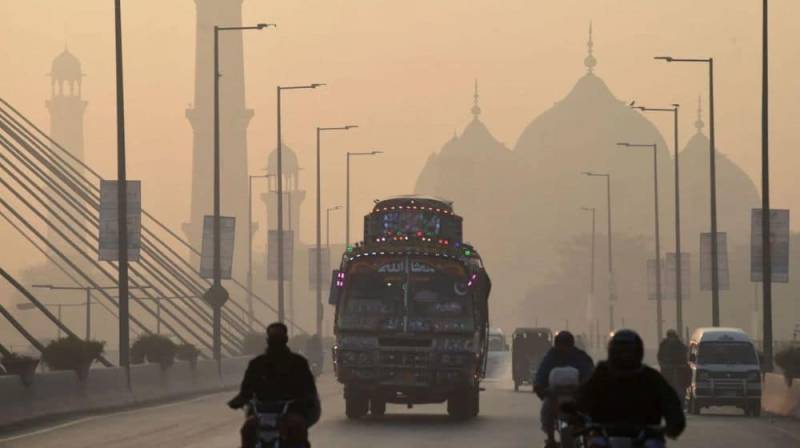Traders can open markets on Sundays if they want, says commissioner.
Government departments may operate with 50% strength.
Unusual traffic in metropolis is the main reason behind smog.
LAHORE: The Punjab government is mulling imposing coronavirus-like restrictions in Lahore to control the worsening smog situation in the provincial capital, it emerged Tuesday.
According to sources, the authorities are likely to announce a complete shutdown on Wednesdays when all schools, markets, and factories will be closed.
Under the new policy, the government departments will operate with 50% strength on Wednesday, said the sources, adding that it has also been advised to carry out snap-checking on weekends — Saturday and Sunday.
The unusual traffic in the metropolis is the main reason behind smog while emissions from factories only contribute 7% in overall pollution in Lahore.
It has also been suggested, according to sources, to impose heavy fines on factories violating the law and shut them in case of continuous ignorance of the directives.
The sources shared that the highest level of smog is recorded on the first three days of the week — Monday to Wednesday.
Meanwhile, Commissioner Muhammad Ali Randhawa said the authorities will announce a work from home policy for two months to combat smog in the Lahore Division.
The commissioner said this after he along with CCPO Bilal Siddiqui met traders to discuss the proposal to keep markets closed on Wednesdays.
The commission said traders supported the measure to keep markets closed on Wednesdays as part of the anti-smog measures.
“Traders can open markets on Sundays if they want,” the commissioner added.
The traders apprised the Lahore administration of their suggestions to combat smog in the provincial capital and recommended keeping the working hours of the markets different.
The commissioner said final decision about market timings and closure will be made after taking traders into confidence.
Air pollution shortens life expectancy
Increasing air pollution in Pakistan may shorten life expectancy by at least seven years in the country’s most polluted regions like Lahore, Sheikhupura, Kasur and Peshawar, said a report published by the University of Chicago’s Energy Policy Institute (EPIC) in its latest Air Quality Life Index (AQLI) in August this year.
According to AQLI — a pollution index that translates particulate air pollution into its impact on life expectancy — particulate pollution is the second greatest threat to human health in Pakistan (behind cardiovascular diseases), reducing 3.9 years of life on average.
If Pakistan meets the World Health Organization (WHO) guidelines of limiting average annual PM 2.5 concentration to 5 micrograms per cubic meter, the average resident in the country could gain 3.9 years.
In contrast, child and maternal malnutrition, and maternal and neonatal disorders reduce average life expectancy by 2.7 years.
All of Pakistan’s 240 million people live in areas where the annual average particulate pollution level exceeds the WHO guideline. According to the report, 98.3% of the country’s population lives in areas that exceed its own national air quality standard of 15 micrograms per cubic meter.
The AQLI also stated that from 1998 to 2021, average annual particulate pollution increased by 49.9% in Pakistan which reduced life expectancy by 1.5 years.
In Punjab, Islamabad, and Khyber Pakhtunkhwa — the most polluted provinces of the country — 65.5 million residents, or 69.5% of Pakistan’s population are on track to lose between 3.7 to 4.6 years of life expectancy on average relative to the WHO guideline and between 2.7 to 3.6 years relative to the national standard if the current pollution levels persist, AQLI stated.
The report further read that if Pakistan would meet WHO’s guideline, then Karachi residents would gain 2.7 years of life expectancy whereas residents of Lahore would gain 7.5 years and people in Islamabad would gain about 4.5 years of life expectancy.
The report added that India is responsible for about 59% of the world’s increase in pollution since 2013.

